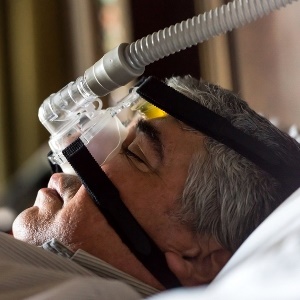
Sleep apnoea may boost the odds of developing two serious health complications following surgery.
Repeated breathing disruptions
So, finding out if you have the sleep disorder beforehand – and seeking treatment – could boost your odds for good recovery from surgery, researchers say.
The two post-op complications are blood clots in the veins and an irregular heartbeat called atrial fibrillation, according to two new studies.
These problems occurred more often among surgical patients who had not yet been diagnosed – and therefore weren't treated – with sleep apnoea.
Obstructive sleep apnoea is characterised by repeated breathing disruptions during sleep. Symptoms include excessive daytime sleepiness, restless sleep and loud snoring – often with periods of silence followed by gasps.
Read: Sleep apnoea may cause nighttime urination
More than half of surgery patients who have sleep apnoea don't know it, the authors of one new study said. Identifying these patients ahead of time might spare them serious post-op complications, the findings suggest.
Higher risk for complications
Dr Gregg Fonarow, a professor of cardiology at the University of California, Los Angeles, said the relationship between diagnosed obstructive sleep apnoea and post-operative complications is well-documented, with the new research "confirming findings from prior studies".
Sleep apnoea appears to expose the heart to "mechanical stress", while also leading to vascular inflammation and an increased risk for blood clots, he explained.
"These physiologic changes could place patients undergoing (open-heart) surgery at higher risk for complications," said Fonarow, who wasn't involved in the study.
Still, this study doesn't establish a direct cause-and-effect relationship between untreated sleep apnoea and atrial fibrillation or venous blood clots. And Fonarow isn't sure that treating the sleep disorder would actually prevent these complications.
Read: Even mild Sleep Apnoea raises stroke risk in men
Both studies are scheduled for presentation in Los Angeles, at the annual meeting of the American College of Chest Physicians (CHEST). Until the findings are peer-reviewed for publication in a medical journal, they should be considered preliminary.
One study looked at more than 200 patients having open-heart bypass surgery between 2013 and 2015 to see how a high risk for sleep apnoea affected the likelihood of developing atrial fibrillation afterward.
'High-risk-but-undiagnosed'
Those at high risk of sleep apnoea met three of these criteria: being older than 65; snorers; very obese; or having high blood pressure.
Almost 20 percent were considered at high risk for sleep apnoea. Two-thirds were at low risk, and nearly 15 percent had already been diagnosed with the sleep disorder, according to the study.
Study senior author Dr Samir Patel said his team found that high-risk-but-undiagnosed sleep apnoea patients do have "more chances of developing [atrial fibrillation] compared to a person who already has sleep apnoea, or a person who has a low risk of developing [sleep apnoea]."
And when these undiagnosed/untreated sleep apnoea patients developed atrial fibrillation after heart surgery, their chances for extended hospitalisation and/or death increased as well, added Patel. He's an internal medicine physician with Western Reserve Health Education in Youngstown, Ohio.
Atrial fibrillation occurred among almost 70 percent of high-risk, untreated sleep apnoea patients, Patel said. This compared with only about 41 percent of both the low-risk and diagnosed sleep apnoea patients.
Patel said patients preparing for open-heart surgery should be tested for sleep apnoea in advance, particularly if they seem to be at high risk and/or have telltale symptoms, such as excessive snoring.
The most common treatment for obstructive sleep apnoea is called continuous positive airway pressure, or CPAP. CPAP requires wearing a face or nose mask during sleep. The mask is connected to a pump that provides continual airflow in order to keep the airways open.
Read: Kidney patients with apnoea at risk for BP
The second study found greater risk for other post-surgical complications among 40 patients at high risk for the sleep disorder compared to 50 already being treated for sleep apnoea.
Venous thromboembolism
Researchers led by Dr Mohammed Aljasmi of the Henry Ford Hospital in Detroit looked at the post-surgery risk for developing breathing complications, heart problems and medical issues that require hospitalisation in an intensive care unit. Surgeries were described as elective, rather than exclusively heart-related.
Those undiagnosed but deemed at high risk of sleep apnoea faced significantly greater odds for developing venous thromboembolism, a potentially life-threatening blood clot in the vein, they found.
The findings suggest high-risk sleep apnoea patients will fare better after surgery if they first get a sleep apnoea diagnosis and begin treatment, the researchers said.
Fonarow, however, isn't convinced that early diagnosis and treatment of sleep apnoea would actually lower post-op risks.
He pointed to a large, randomised clinical trial of more than 2,700 patients that found CPAP provided no benefit in lowering cardiovascular events or heart-rhythm disorders in patients with established heart disease.
Read more:
Brain damage seen in people with severe Sleep Apnoea




 Publications
Publications
 Partners
Partners











